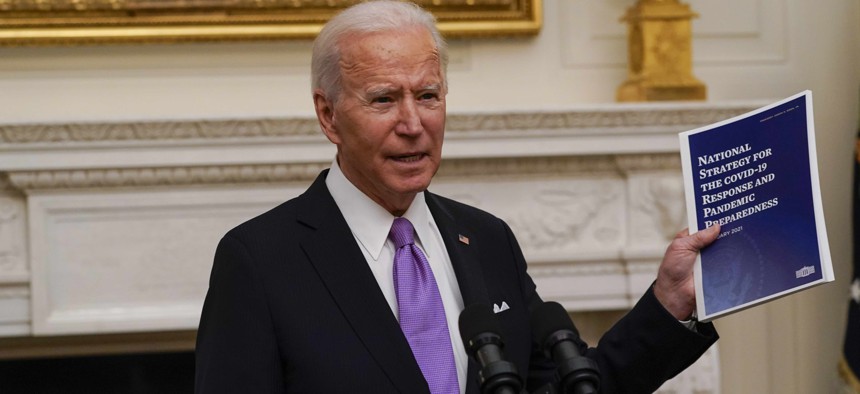Liaisons to Each State, Full National Guard Reimbursement Are Part of Biden's Virus Response Plan

President Joe Biden holds a booklet as he speaks about the coronavirus in the State Dinning Room of the White House, Thursday, Jan. 21, 2021, in Washington. AP Photo/Alex Brandon
On his second day in office, President Joe Biden outlined a wide-ranging coronavirus response strategy, shifting toward a more national approach than the Trump administration's.
President Biden said on Thursday that he would direct the Federal Emergency Management Agency to designate liaisons for all of the 50 states to help coordinate state and federal efforts in the fight against the coronavirus pandemic.
He also signed an executive order to begin reimbursing states for their full National Guard costs tied to the Covid-19 response, saying it was a move both Democratic and Republican governors had called for. Those executive actions were announced as part of a broader national virus response strategy that Biden unveiled on his second day in office.
The framework is designed to help increase vaccinations and mitigate the virus' spread with testing, mask requirements and other measures. It also outlines plans to fill shortfalls with supplies needed for the response and calls on federal agencies to provide guidance for reopening schools and child care centers. Elements of the plan are aimed at addressing equity issues as well—Black, Latino and Native American people have been hit especially hard by the virus.
Biden warned that there are still difficult days ahead and predicted the nation's Covid-19 death toll will likely exceed 500,000 by next month. It is already over 400,000. "Things are going to continue to get worse before they get better," he said. In a dig at the Trump administration, Biden called the nation's vaccine rollout "a dismal failure thus far."
With his strategy, Biden is attempting to put in place a response effort that is more nationally coordinated and federally led compared to the approach the Trump administration took, which left more to the states.
Biden said his administration would “take immediate steps to partner with governors, mayors and other local officials,” who he said are “on the front lines of this fight.” The state liaisons, he added, would ensure that “every state will have a point person at the federal level.”
A presidential memorandum Biden signed directs FEMA to up the reimbursement rate to 100%, from 75%, for state National Guard costs related to the Covid-19 response, and certain other eligible expenses.
The president reiterated his administration's target of delivering 100 million vaccination shots nationwide during his first 100 days in office. Some public health experts have questioned whether that pace is fast enough given the death rate and other consequences of the outbreak. Others say it will be a challenge to meet the 100 million mark.
As part of Biden's plans to ramp up vaccinations, he said he would direct the Federal Emergency Management Agency to stand up community vaccination centers, with the goal of having 100 of them established in the next month. He also said the U.S. Centers for Disease Control and Prevention would establish a program to help make vaccines available in local pharmacies and he described initiatives to boost the number of workers who are available to give people shots.
Biden also issued an executive order calling on agencies to take immediate action to require people to wear face coverings during interstate travel on airplanes, trains and intercity buses.
Additionally, Biden directed federal agencies to use "all available legal authorities"—including the Defense Production Act— to eliminate supply shortfalls. The Defense Production Act is a Cold War-era law with provisions geared toward boosting the production of critical goods during national emergencies.
States and localities are clamoring for more vaccine doses and in some cases canceling scheduled appointments for shots due to limited supplies. But it's unclear how quickly the steps that Biden is taking might ramp up production of the vaccine, particularly given limits with manufacturing capacity.
Bill Lucia is a senior reporter for Route Fifty and is based in Olympia, Washington.
NEXT STORY: These Are the Safest States To Ride Out the Pandemic






